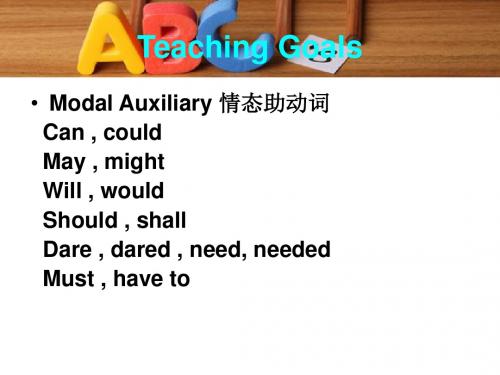情态动词配套PPT 高考英语 语法
合集下载
高中英语 情态动词用法归纳(全)(共63张PPT)

1. You shall fail if you don’t work hard.(警告) 2. He shall have the book when I finish it.(允诺) 3. He shall be punished.(威胁)
六、 will, would
1) 表示请求、建议等,would更委婉。 Will / Would you pass me the ball, please? 2) 表示意志、愿望和决心。 1. I will never do that again. 2. They asked him if he would go abroad.
口语中更常见。
2)用于祈使句,表示祝愿。 May you succeed!
二、 may, might
3) 表示推测、可能性(不用于疑问句)。 might不是过去式,它所表示的可能性比may小。 1.He may /might be very busy now. 2.Your mother may /might not know the truth.
2. He doesn’t dare (to) answer.
3. He needs to finish his homework today.
五、 shall, should
1) shall 用于第一人称,征求对方的意见。
What shall we do this evening?
2) shall 用于第二、三人称,表示说话人给对方的命令、警告、 允诺或威胁。
七、should, ought to
1) should, ought to表示“应该”,ought to表示义务或责任, 比should语气重。
1. I should help her because she is in trouble.
六、 will, would
1) 表示请求、建议等,would更委婉。 Will / Would you pass me the ball, please? 2) 表示意志、愿望和决心。 1. I will never do that again. 2. They asked him if he would go abroad.
口语中更常见。
2)用于祈使句,表示祝愿。 May you succeed!
二、 may, might
3) 表示推测、可能性(不用于疑问句)。 might不是过去式,它所表示的可能性比may小。 1.He may /might be very busy now. 2.Your mother may /might not know the truth.
2. He doesn’t dare (to) answer.
3. He needs to finish his homework today.
五、 shall, should
1) shall 用于第一人称,征求对方的意见。
What shall we do this evening?
2) shall 用于第二、三人称,表示说话人给对方的命令、警告、 允诺或威胁。
七、should, ought to
1) should, ought to表示“应该”,ought to表示义务或责任, 比should语气重。
1. I should help her because she is in trouble.
高三英语新高考复习优秀PPT情态动词课件

【名校课堂】获奖PPT-高三英语新高 考复习 课件第 七章情 态动词 课件( 最新版 本)推 荐
【名校课堂】获奖PPT-高三英语新高 考复习 课件第 七章情 态动词 课件( 最新版 本)推 荐
Would you like me to carry it for you? 我帮你拿这个好吗?(委婉) Would you please not sing so loudly? 你能别唱这么大声吗?(委婉的否定)
【名校课堂】获奖PPT-高三英语新高 考复习 课件第 七章情 态动词 课件( 最新版 本)推 荐
【名校课堂】获奖PPT-高三英语新高 考复习 课件第 七章情 态动词 课件( 最新版 本)推 荐
疑问句中可用can/could(能) 表示推测。如: Could he have finished his task? 他能完成任务吗?
第七章 情态动词
知识梳理
一、概念及分类 1. 情态动词+动词原形 情态动词表示说话人对有关行为或事物的态度及看法, 认为其可能、 应该或必要等, 不能单独作谓语, 只能和其他动词原形一起作谓语。 2. 情态动词有四类 ①只作情态动词: must, can(could), may(might), ought to ②可作情态动词, 又可作实义动词: need, dare ③可作情态动词, 又可作助动词: shall(should), will(would)
【名校课堂】获奖PPT-高三英语新高 考复习 课件第 七章情 态动词 课件( 最新版 本)推 荐
【名校课堂】获奖PPT-高三英语新高 考复习 课件第 七章情 态动词 课件( 最新版 本)推 荐
(4)dare作为情态动词, 后面直接加动词原形, 无人称和数的变化, 不 受时态的影响。 主要用于疑问句、否定句及条件状语从句中。 如: Dare you go home alone? 你敢一个人回家吗? She dare not say what she thinks. 她不敢说出她的想法。 No one dare speak of it. 没有人敢谈这件事。
【名校课堂】获奖PPT-高三英语新高 考复习 课件第 七章情 态动词 课件( 最新版 本)推 荐
Would you like me to carry it for you? 我帮你拿这个好吗?(委婉) Would you please not sing so loudly? 你能别唱这么大声吗?(委婉的否定)
【名校课堂】获奖PPT-高三英语新高 考复习 课件第 七章情 态动词 课件( 最新版 本)推 荐
【名校课堂】获奖PPT-高三英语新高 考复习 课件第 七章情 态动词 课件( 最新版 本)推 荐
疑问句中可用can/could(能) 表示推测。如: Could he have finished his task? 他能完成任务吗?
第七章 情态动词
知识梳理
一、概念及分类 1. 情态动词+动词原形 情态动词表示说话人对有关行为或事物的态度及看法, 认为其可能、 应该或必要等, 不能单独作谓语, 只能和其他动词原形一起作谓语。 2. 情态动词有四类 ①只作情态动词: must, can(could), may(might), ought to ②可作情态动词, 又可作实义动词: need, dare ③可作情态动词, 又可作助动词: shall(should), will(would)
【名校课堂】获奖PPT-高三英语新高 考复习 课件第 七章情 态动词 课件( 最新版 本)推 荐
【名校课堂】获奖PPT-高三英语新高 考复习 课件第 七章情 态动词 课件( 最新版 本)推 荐
(4)dare作为情态动词, 后面直接加动词原形, 无人称和数的变化, 不 受时态的影响。 主要用于疑问句、否定句及条件状语从句中。 如: Dare you go home alone? 你敢一个人回家吗? She dare not say what she thinks. 她不敢说出她的想法。 No one dare speak of it. 没有人敢谈这件事。
【高考】英语语法完全讲解情态动词ppt课件

can/could have done“过去本能够做某事,实际上并 没有做”。 You could have done better, but you didn’t try your best.
may/might have done“过去也许已经做过某事”,否 定形式may/might not have done表示“过去可能没做 过某事”;might have done还表示“过去本可能做某 事,实际没有做”。 It’s too late. I think he may have gone to bed. He may/might not have finished the work. But I think you might have told us half an hour ago.
--Yes, you can/may(No, you can’t/mustn’t). 2、shall在疑问句中与第一人称连用时,表示征求对方意见; 情态动词can和could常用来表示“能力”,强调能够做某事,can表示现在的能力,could表示过去的能力。
He dared not look at her in the face. You could have done better, but you didn’t try your best.
2.中国应对全球化的政策
Tom’s father promises 44、关于(爱)这个字眼,又有几人能读懂能将其看透。
:北方地区
that
he
shall
buy
his
son
a
new bike on his birthday.
第四大类:表示必要、偏要
must表示主观上必须做某事,mustn't表示“禁止、一定不可 以”,还可以表示“偏偏、偏要”,have to表示受客观条件的 限制,不得不做某事。should表示应该做某事,有义务做某事, 此外,should还可以表示“竟然、居然”。 Children mustn’t play with fire. She must do anything against her parents’ will. You should go and visit him this afternoon. It is unbelievable that the poor man should help others. Why should you be so late today? --Must I work out the problem tonight? --No, you needn’t/don’t have to.
高考英语情态动词课件(共21张PPT)

He shall get his money.
5)Should 表示说话人的惊奇、愤怒、失望等特殊情感 It’s surprising that Mary should love such a person as Jack. It’s strange that … It’s unthinkable that … I’m sorry that…
肯定疑问 Dare we run? 句
Do we dare (to) run?
否定疑问 Dare he not run? Doesn’t he dare to run ? 句
Need, needed
Need /needed
1、情态动词用于否定句,疑问句 He needn’t worry about it.
This will be the house you're looking for .
Will , would
5)would常用于虚拟条件句,表示与事实相反或不太可能实现的情况 But for your help we would have been late .
6) Would 表示过去的习惯性动作或某人的一典型动作,又使人厌烦的感 觉。 He would go swimming in summer when he was in the countryside.
3.表示请求和允许,与may同义,相当于be allowed to.常用语口语中。 You can smoke in this room. Could I borrow you dictionary?
Can , could
4.用于一些固定句型 a. Cannot ( can never) …too…怎么也不过分
如询问某种可能时,应用can。 He must know my address. (一定) He can’t know my address. (一定不) Can he know my address? (询问可能性)
5)Should 表示说话人的惊奇、愤怒、失望等特殊情感 It’s surprising that Mary should love such a person as Jack. It’s strange that … It’s unthinkable that … I’m sorry that…
肯定疑问 Dare we run? 句
Do we dare (to) run?
否定疑问 Dare he not run? Doesn’t he dare to run ? 句
Need, needed
Need /needed
1、情态动词用于否定句,疑问句 He needn’t worry about it.
This will be the house you're looking for .
Will , would
5)would常用于虚拟条件句,表示与事实相反或不太可能实现的情况 But for your help we would have been late .
6) Would 表示过去的习惯性动作或某人的一典型动作,又使人厌烦的感 觉。 He would go swimming in summer when he was in the countryside.
3.表示请求和允许,与may同义,相当于be allowed to.常用语口语中。 You can smoke in this room. Could I borrow you dictionary?
Can , could
4.用于一些固定句型 a. Cannot ( can never) …too…怎么也不过分
如询问某种可能时,应用can。 He must know my address. (一定) He can’t know my address. (一定不) Can he know my address? (询问可能性)
高考英语语一轮复习——情态动词课件(共57张PPT)

He used to / would smoke while writing.
She used to be fat.
shall
1)在疑问句中shall用于一, 三人称,表示 征求对方的意见或指示
Shall he come to see you?
What shall I do to help you? 2) 在陈述句中shall 用于二,三人称,表示
作为情态动词will 可以用于条件状语从句
would和used to
1)used to表示过去与现在或过去某时与后 来的情况有不同,而would只表过去的情况 (过去往往)。
People used to think that the earth was flat.
She would go out for a walk in the morning when she was in the country. 2)used to可表示过去习惯性的动作和经常 的状态,would只表示过去习惯的动作。
You should have come here earlier.
1.Students should respect teachers.
2.He suggested that we should act at once.
3.The boys shouldn’t be playing football. They should be at school.
---No, you __n_ee_d_n’t____.
don’t have to
will 和would
1.will 在疑问句中表示请求和建 议.would 比will 更婉转,礼貌 Will you come to my office?
She used to be fat.
shall
1)在疑问句中shall用于一, 三人称,表示 征求对方的意见或指示
Shall he come to see you?
What shall I do to help you? 2) 在陈述句中shall 用于二,三人称,表示
作为情态动词will 可以用于条件状语从句
would和used to
1)used to表示过去与现在或过去某时与后 来的情况有不同,而would只表过去的情况 (过去往往)。
People used to think that the earth was flat.
She would go out for a walk in the morning when she was in the country. 2)used to可表示过去习惯性的动作和经常 的状态,would只表示过去习惯的动作。
You should have come here earlier.
1.Students should respect teachers.
2.He suggested that we should act at once.
3.The boys shouldn’t be playing football. They should be at school.
---No, you __n_ee_d_n’t____.
don’t have to
will 和would
1.will 在疑问句中表示请求和建 议.would 比will 更婉转,礼貌 Will you come to my office?
情态动词配套PPT 高考英语 语法

• It is amazing that sb should do sth/ should have done sth
• It is amusing that sb should do sth/ should have done sth • It is funny(奇怪的;滑稽的)that sb should do sth/ should
• 3.表客观可能性(用在肯定句中)
• Sometimes the dog can be dangerous. • 如:Harvest and Thanksgiving festivals can
be very happy events. • 再如:Little Jimmy can be very naughty
• “依据双方所签订的协议,这些利息会被分成5部分,” 法官宣布说。(高高在上宣布的口吻)
• 2.Tell him he shall have an answer tomorrow. • 告诉他我明天会给他一个答复的。(允诺的口吻) • 3.It has been announced that candidates(考生)
做)
• Exercise 1: 按要求翻译下列句子。 • 1.他不敢爬那棵树(分别以dare作为情态动词及
• 如:Most ancient festivals would celebrate the end of cold weather, planting in spring and harvest in autumn.
• 2.表示人的意愿、愿望和决心 • I will never lose heart.(决心)
• 第一章 can和must • 一、can——下面是can的几种基本用法,请根
• It is amusing that sb should do sth/ should have done sth • It is funny(奇怪的;滑稽的)that sb should do sth/ should
• 3.表客观可能性(用在肯定句中)
• Sometimes the dog can be dangerous. • 如:Harvest and Thanksgiving festivals can
be very happy events. • 再如:Little Jimmy can be very naughty
• “依据双方所签订的协议,这些利息会被分成5部分,” 法官宣布说。(高高在上宣布的口吻)
• 2.Tell him he shall have an answer tomorrow. • 告诉他我明天会给他一个答复的。(允诺的口吻) • 3.It has been announced that candidates(考生)
做)
• Exercise 1: 按要求翻译下列句子。 • 1.他不敢爬那棵树(分别以dare作为情态动词及
• 如:Most ancient festivals would celebrate the end of cold weather, planting in spring and harvest in autumn.
• 2.表示人的意愿、愿望和决心 • I will never lose heart.(决心)
• 第一章 can和must • 一、can——下面是can的几种基本用法,请根
高中英语语法专题复习课件--情态动词(共22张PPT)

but one of them 8. __c_o_u_ld___ (must, could) be your last. Decisions! Decisions! You may ask: 9. __m__u_st___ (can, must) I make decisions? The answer is yes. In most cases, you 10. __c_a_n_'_t__ (can't, needn't) skip this process.
_m__ig_h_t___ (shall, might) become the
richest.
(江西2014)
5. George __c_a_n_'t___ (mustn't, can't) have
gone too far. His coffee is still warm.
(浙江2016)
6. I _n_e_e_d_n_'_t_ (needn't, couldn't) have
2. No reader __s_h_a_ll___ remove a book from the library without the permission of the librarian.
can shall may should need
3. The girl ___ca_n____ not be Mary — she's in New York.
3. “情态动词+ have done”结构 1) could / might / should / ought to / need
have done意为“本来能/可能/应该/需 要做……,但实际上未做……”。如: He could have escaped, but he chose to stand and fight. It was an easy test and he should have passed, but he didn't.
06 情态动词-2021高考英语一轮语法点及题型讲解课件 (共47张PPT)

功能一:1.推测(现在)
注意:关于这些词的否定
1)must not 表示“严令禁止”,不属于推测 Eg:You must not play with fire. 2)may/might not “可能不” Eg:He may/might not know the truth. 3) can/could not “不可能” Eg: He/can could not know the truth.
功能一:1.推测(现在)
must
一定(用于肯定)
eg:She must be a teacher.
(她一定是一名老师。)
should
应该
eg:She should be a teacher.
(她应该是一名老师。)
can,could,may,might
可能(can无肯定,may无疑问)
eg:She can/could/may/might be a teachWerR. ITE(她D可OW能N是Y一O名U老R T师E。XT)HERE
should
be supposed
to/ought to
would
be going to
情态动词的功能
功1.能推一测:;推测-----2.虚拟; 3.定义。
Add your text here and write down your personal idea add your text here and write down your personal idea add your text here
【答案】D
your text here
练习:
3.【2007·陕西】I
told
your
friend
- 1、下载文档前请自行甄别文档内容的完整性,平台不提供额外的编辑、内容补充、找答案等附加服务。
- 2、"仅部分预览"的文档,不可在线预览部分如存在完整性等问题,可反馈申请退款(可完整预览的文档不适用该条件!)。
- 3、如文档侵犯您的权益,请联系客服反馈,我们会尽快为您处理(人工客服工作时间:9:00-18:30)。
• 3.表客观可能性(用在肯定句中) • Sometimes the dog can be dangerous. • 如:Harvest and Thanksgiving festivals can be very happy events. • 再如:Little Jimmy can be very naughty sometimes. • 4.表示猜测(用于否定、疑问和感叹句中) • The phone is ringing. But who can it be? • It can’t be Jenny. She has gone home already.
• 即时练习:把下列句子翻译成中文,并说明各自包含什 么语气(命令、警告、允诺还是威胁?) • 1.“The interest shall be divided into five parts, according to the agreement made by both sides,” declared the judge. • “依据双方所签订的协议,这些利息会被分成5部分,” 法官宣布说。(高高在上宣布的口吻) • 2.Tell him he shall have an answer tomorrow. • 告诉他我明天会给他一个答复的。(允诺的口吻) • 3.It has been announced that candidates(考生) shall remain in their seats until all the papers have been collected. • 考生必须留在自己的座位上直到所有的试卷被收完。 (命令的口吻)
• 2.表示人的意愿、愿望和决心 • I will never lose heart.(决心) • If you will listen to me, I will tell you the whole story. • 思考:这里的if从句为什么用了将来时呢?这个 句子应该如何准确翻译呢? • 如果您愿意听我讲的话,我会把事情详细讲给你 听。 • 结论:这里并不是将来时态,而是表示人的意愿, 是比较礼貌的说法,通常用于下级对上级或晚辈 对长辈,通常可翻译成:如果您肯赏脸……
• • • • •
比较:Will he come in or wait outside? 思考:该怎样准确翻译这句话? 他(自己的意愿)是想进来还是想在外面等? 结论: Shall he come in…=Do you want/wish him to come in… • Will he come in…=Does he want/wish to come in…
• 例3:我们必须尽力忠于职守。 We can not be too faithful to our duties. • can not/never...too..., cannot/never----over” • 再……也不过分,应尽量,越---越好 • 环保的重要性无论如何强调也不过分。 • The importance of environmental protection can not be over emphasized.
• 2)把下列句子翻译成中文,并把其所包含的语气演示 出来。 • He shall be punished if he goes on behaving badly. (I am threatening him.) • 如果他继续这样子下去的话,我敢说他将会收到惩罚! (威胁的语气) • If you listen to me, dear, you shall get some candies. (I promise you.) • 如果你乖乖地听我讲,亲爱的,我答应给你一些糖吃。 (承诺的语气) • You shan’t go to the party if you don’t finish your homework first. (I am warning you!) • 如果你不先完成作业的话,我就不让你去参加派对。 (警告的语气) • 结论:shall用于第二、第三人称陈述句,表示说话人 给对方的命令、警告、允诺或威胁等。
• Think: how to translate “can not...too...” • 例1: We cannot be too careful of health. • 我们无论如何注意健康也不为过。
• 例2:你开车时再小心也不过分。 • You cannot be too careful when you drive a car.
• 3.表示物的趋势 • He pushed the door hard, but it wouldn’t open.(物的趋势) • She tried hard to lift the box, but it wouldn’t move.(物的趋势) • 思考:这两个句子改怎样翻译? • 他用力推门,但是门一动也不动。 • 她用力想举起那个盒子,但是它动也不动。
• Key to the exercise. • Key: 1-5 CCBCB; 6-10 CBDBA; 11-15 BCBDA; 16-20 BCBDD; 21 C
பைடு நூலகம்
• • •
• •
• 第二章 will和shall, should 下面我们来看一下will和shall的其他一些用法。 Will 1.will的过去式would可表示过去反复发生的动 作、习惯或倾向。有时可以跟used to互换。 When I was young, I would/ used to sit at the door and watch the sunset. 如:Most ancient festivals would celebrate the end of cold weather, planting in spring and harvest in autumn.
• 4、用于疑问句或if条件句,表示“非得”; “偏要” • Must you go now? Can’t you stay for a little while? • 如:Must you talk so loudly? Can’t you just quiet down? • 又如:If you must know, I can tell you.
•
• • • • •
• 第一章 can和must 一、can——下面是can的几种基本用法,请根 据例句和分类模仿写出至少两个例句。 1.表能力 A computer can’t think for itself. 2.表请求和允许 Could/Can I come to see you tomorrow? Yes, you can.(不能用could回答)
• 二、must——下面是must的几种基本用法,请 根据例句和分类模仿写出至少两个例句。 • 1、肯定表示必须,否定表示禁止 • You must come in time. • Your mother is asleep, so you mustn’t make any noise. • --Must/Need we finish all the work in class? • --Yes, you must/have to. • --No, you needn’t/ don’t have to. • 翻译这个句子:只要你努力,你一定成功!(注 意母语对翻译的影响) • You will succeed as long as you work hard. • will --- 一定会 must ---一定要
• 2、表示推测(只用于肯定句,用于此含义时, 它的否定形式为can’t) • This must be your pen. • 否定句为:This can’t be your pen. • 3、用于must not always be doing sth,表示 “不要老是……” • If you really want yourself to be in good health, you mustn’t always be smoking so much.
• Key:1-5 DCAAD; 6-10 BDDBA; 11-15 CAAAD; 16-20 ADCAA; 21-26 CDBADB
• 第三章 dare和need • 其实dare和need的意思和语气都是相对简单的和容易 掌握的,不过它们唯一特别之处在于它们既可以充当情 态动词,也可以充当实意动词。请自己查字典,从例句 中学习并记录一下这两个词的一些特殊搭配和用法吧! • Dare——注意收集一些dare的固定词组。 • Need • 注意区分needn’t have done和needn’t do 还有didn’t need to do 的区别 • needn’t have done本来没必要做(但事实上做了) • needn’t do(现在或将来)没必要做 • didn’t need to do(过去)没有必要做(事实上也没有 做)
• Should • 一、那请看一下在下面的句子中should是什么意思? • It is strange that you should believe such a dishonest person as him. • 上句中的should是“竟然”、“居然”的意思 • 另外还有以下句型中的should都是“竟然”、“居然”的意思: • It is strange that sb should do sth/ should have done sth • It is surprising that sb should do sth/ should have done sth • It is amazing that sb should do sth/ should have done sth • It is amusing that sb should do sth/ should have done sth • It is funny(奇怪的;滑稽的)that sb should do sth/ should have done sth • It is ridiculous(荒谬的)that sb should do sth/ should have done sth • It is unbelieveable that sb should do sth/ should have done sth • 请挑其中三个来造句:
